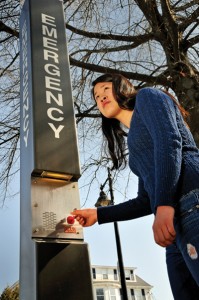Are You Safe On Campus? College Security 101
What every college student should know!
Your teen is off to college. How exciting! He/she is embarking on a new journey to further education, explore opportunities, make new friends, and begin life as a young adult. You’ve done all the right things in preparation ─ you shopped together for desk lamps and linens, registered for orientation, and paid the deposit for the first semester. However, the most important question is: Have you prepared your teen with strategies to stay safe while living away from home?
College campuses can be safer than their surrounding communities, but this can provide a false sense of security. Students need to be alert and cautious, particularly at night, and should not let their guard down once they’ve become “comfortable” on campus. Campus crime is a reality, so it is imperative that students familiarize themselves with the available safety resources.
Safety Resources
General: Safety is at the forefront of parents’ minds when they send their teen away for the first time. “Our students’ safety and well-being is our top priority,” says Grant Heston, associate vice president of Communications and Public Affairs at the University of Central Florida (UCF). “We are diligent in ensuring that our campus is safe for all students, particularly for those who have made it their home.”
 Captain Jeff Holcomb, a public information officer for the University of Florida (UF) Police Department, reports that members of the division, as well as victim advocates, offer a presentation to incoming students at Preview (UF’s orientation) so that they are aware of accessible resources, which will vary from campus to campus, so be sure to investigate campus safety information as part of the college search process. Safety brochures and programs are usually listed on university websites.
Captain Jeff Holcomb, a public information officer for the University of Florida (UF) Police Department, reports that members of the division, as well as victim advocates, offer a presentation to incoming students at Preview (UF’s orientation) so that they are aware of accessible resources, which will vary from campus to campus, so be sure to investigate campus safety information as part of the college search process. Safety brochures and programs are usually listed on university websites.
Alerts: Schools are required by law to have mass notification systems to warn students and faculty should a safety situation arise. Ken Miller, director of campus safety at Rollins College in Winter Park, urges parents to familiarize themselves with the emergency system that their teens have access to. “Many times, they will allow students to add additional phone numbers and email addresses for parents.”
Heston reports, “We have a robust mass notification system.” UCF Alert uses several communication tools, including emails, text messages, Web updates, and sirens. “All of these tools help keep students and others safe and informed.” However, Heston boasts UCF Police Department as the campus’ most important safety tool. “When UCF Police Department received a 911 call on March 18, 2013 about a shooter on campus, officers arrived on the scene in less than four minutes,” Heston recalls.
Blue-Light Emergency Phones: Many universities have blue-light emergency telephones which are highly visible and easily accessible throughout the grounds. “These allow direct access to campus safety staff and, if needed, the police department,” explains Miller.
Mobile Phone Apps: Cell phone applications are the new trend in campus security. Many colleges are opting to use such applications in addition to traditional alert systems (landlines and email). Captain Holcomb says, “We have the Blue-Light Emergency Phones and we are looking into a mobile application for the spring 2014 semester.” Some services provide a panic button so students can instantaneously send pertinent information (such as GPS location and student ID #) to campus security from their cell phone. Rave Guardian, for example, is a mobile safety option used by colleges throughout the United States.
Classes: Most colleges offer classes in self-defense and in how to reduce one’s chances of becoming a victim of sexual assault. For instance, UF offers programs on stalking, personal safety, relationship violence, and RAD (Rape Aggression Defense). Students should take advantage of these invaluable teachings.
Escort Services: At UF, a program called SNAP (Student Nighttime Auxiliary Patrol) provides free, nightly campus safety and transportation services, including walking escorts and point-to-point van service. UCF’s escort program is called SEPS (Safe Escort Patrol Service). This free, nightly service runs until 1 am (students are urged to call UCF PD after 1 am). Students should not hesitate to use such escort services if they feel uncomfortable returning to their dorm alone.
Theft: Holcomb believes that students should be more prudent about keeping their belongings locked up. “Theft is the most common crime on our campus,” he reports. “Students aren’t as careful with their property as they should be. They should be mindful about securing property at all times and also about locking doors and checking windows before going to bed.”
Laptop theft is a major issue. “I would strongly encourage the use of anti-theft software on all laptops in a higher education environment (e.g. Absolute Computrace),” urges Miller.
Campus Surroundings
The 1990 Jeanne Clery Disclosure of Campus Security Policy and Campus Crime Statistics Act was prompted by the 1986 dormitory rape and murder of 19-year-old Jeanne Clery, a Lehigh University freshman. The act requires colleges to report crime statistics to the Department of Education. “We have to do crime reports that are required by law,” explains Holcomb. “Parents should always look into those numbers.”
Chances are that your teen will venture off campus at some point. Freshmen and transfer students should speak to a resident director or campus security personnel about which surrounding areas should be avoided.
Stay Sober
Students put themselves at risk when they use alcohol or drugs, because their decision-making capabilities become impaired. Ken Miller points out, “Alcohol is a factor in a majority of sexual assault cases.” Students should seek professional help if substance abuse is a personal problem or someone they know is in need of assistance. The Alcohol and Other Drug (AOD) Prevention Programming Office at UCF offers a variety of health services, including education, prevention, intervention, and referrals.
Individual Instincts
Students should remain alert and report suspicious behavior or anything that makes them feel uncomfortable. “Always go with your instincts,” Holcomb advises. He instructs students to call campus police immediately if they believe a crime has occurred or is about to happen.
Safety Checklist
- Register for safety notifications.
- Keep your room locked at all times.
- Don’t let strangers into your residence hall.
- Report threatening, suicidal, or other alarming behaviors of other students.
- Use the campus escort service.
- Avoid going to ATM machines after dark.
- Travel in groups to and from social events.
- Be aware of your surroundings: Don’t wear headphones while walking alone.
- Never leave your property unattended in public places.
- Just say no to alcohol and drugs.
Myrna Beth Haskell is a feature writer and author of “LIONS and TIGERS and TEENS: Expert advice and support for the conscientious parent just like you” (Unlimited Publishing LLC, 2012).








